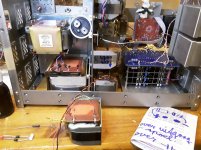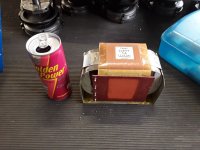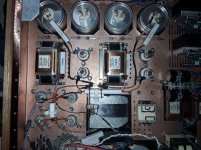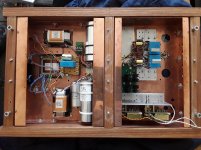Hello,
SO much discussion about wiring a 10 TEN mH choke!!
Get a real choke and connect it according to the book(s)
Greetings,Eduard
P.s as you can see i have used chokes before
SO much discussion about wiring a 10 TEN mH choke!!
Get a real choke and connect it according to the book(s)
Greetings,Eduard
P.s as you can see i have used chokes before
Attachments
I did my aleph j a couple of years ago w a clc and I think I had placed the choke in the middle of the section “1,2” without issue and it measured out fine. Had a friend check it to confirm and the noise was pretty low. Could I have eked out a little more ripple reduction, maybe but I’m certainly not going to move it to find out.
I find LTSpice is a very helpful tool. It provides a quick way to test your hypotheses before bringing out the breadboard. Its accuracy, of course, depends on the model that you give it.
As for the model, a simple one will be generally good enough for first order effects. Higher order effects will require adding resistance, capacitance, and inductance which are part of a real build.
Current will flow along a path of minimum resistance. It could be different between DC and AC. With DC, that would be the shortest path. With AC, capacitive and inductive reactances must be considered.
Adding series resistors to your theoretical design schematic to model the conductor resistances would work for DC analysis. For AC, you would need to also add inductors and capacitors in series/parallel.
Thank you! That's what I needed; the independent variables. You've sparked an idea. It's absolutely half-baked, but it is an idea. It'll require some reading.
I don't know enough to simulate within a board layout where those effects are most prevalent. Extreme_Boky seems to have that knowledge and know from experience.
I can fit a model to almost any data, but is it actually a predictive / useful model? Any climate scientists out there? Anyone tried to model stock prices? Conversely, I can simulate lots of things that don't match real-world results in experiments where I can control the independent variables.
It would be fun (for me) to take two board layouts for a filter network and see if I can learn how they differ within and what differs between.
tl;dr: Yep, same track. 🙂 I just need to learn where on the boards those variables differ and by what amounts. That's what I was after all along.
However, for the case of investigating these choke wiring schemes, I would first just test the hypothesis that the two schemes produce different results. Wire the power supplies up, add a load to each, and then look at the output. Don't worry about the intermediate nodes at this time. You can use your oscilloscope or use a sound card with software like Room Equalization Wizard to perform FFT analysis. I guess the ultimate would be to power an amp to see if you can hear a difference.
Analyze your results and make your conclusions. Are the differences significant? This may lead to further investigations (form new hypothesis, design experiment, run experiment, analyze results, form conclusions). The Scientific Method is useful for solving many different types of problems.
P.S. In post #92, I show a LTSpice simulation which I attempted to model this situation with added resistors to simulate the extra conductor path. I guess I should do a real world experiment to prove or disprove this model. I've got all the parts to do a point-to-point wired circuit.
You and I should agree on what we mean by significant and meaningful independently from one another. 🙂 I've seen a lot of cases where statistically significant differences can be shown, but they're not meaningful in practical applications. If a person has been given a budget to develop a product that performs at X and their experiments get them to 0.1X after exhausting that budget, they've achieved a statistically significant result (if done properly), but failed in a very meaningful way.
If I'm able to learn anything about how this all works, then it's meaningful to me. I doubt I'll ever design a PCB, but who knows? At this point, I struggle with basic circuits. For now, it's knowledge for knowledge's sake.
re: your simulations. I took notice of your post immediately. I admit to scratching my head re: how you chose the values, but that's exactly what was thinking. How does one path within the same copper plane differ from another? 🙂
It may shock you to know that I'm not interested in whether I can hear a difference. That's not important to me. I'm already biased, and conducting a study to remove that bias would be vastly too time consuming. I'm not a golden-eared reviewer. I love music, and I like soldering things and learning a bit along the way. I have become fascinated with this phenomena of electron flow within the same copper plane. I went down a rabbit-hole re: digital filters and learning some signal theory for fun. Why? I dunno. Perhaps it was similar to this. I saw lots of people arguing and figured I should try to become more informed, it piqued my interest. It also showed me what very little I knew or thought I understood.
The scientific method is my primary method for learning. It's hard-wired in, if you'll forgive the pun. However, without a proper research question, testable hypotheses, and a good plan, it can end in heartache. I've seen too many people conduct very costly research experiments only to wind up years later with very little to show for it. Using all your budget to get 1/2 way to an answer or a promised result just doesn't fly. Sometimes we were able to take existing data and still get something meaningful from it. Sometimes they had to start over. Sometimes they went hat in hand for more money and there was no other choice but to provide it due to sunk costs. Sometimes they had to leave. This is all just for fun on my time and money vs. doing research on someone else's dime. However, I still want to do it properly, so I can learn. I'm preaching to the converted, but that's a part of why I want to have at least a basic understanding prior to poking around. If I don't understand what independent variables I'm working with and how they're controlled/what affects them, then I'm just another 'knob turner'.
Sorry for the walls of text, but I wanted to acknowledge your (and other's) help. I gave everyone's posts serious thought, and the efforts put in to pass along some knowledge were greatly appreciated.
I could've just gone with... Thanks again!!!! You've pointed me in the right direction. 😀
Happiest of holiday seasons to everyone!




